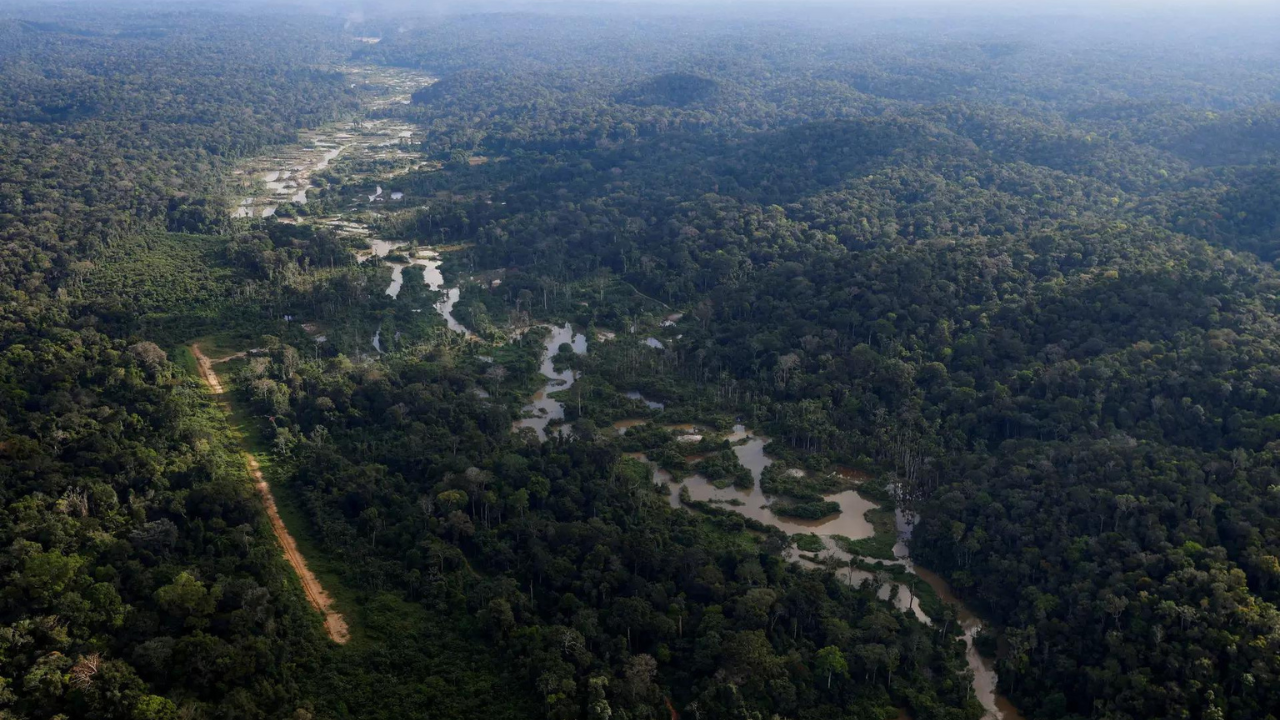RIO DE JANEIRO: Deforestation in the Brazilian Amazon fell by half last year, according to figures released Friday, as President Luiz Inacio Lula da Silva‘s government bolstered environmental policing to crack down on surging destruction.
However, the news was far less bright from the crucial Cerrado savanna below the rainforest, where clear-cutting hit a new annual record last year, rising by 43 percent from 2022, according to the national space research agency’s DETER surveillance program.
Satellite monitoring detected 5,152 square kilometers (nearly 2,000 square miles) of forest cover destroyed in the Brazilian Amazon last year, down 50 percent from 2022.
That still represented a loss 29 times the size of Washington DC in Brazil‘s share of the world’s biggest rainforest, whose carbon-absorbing trees play a vital role in curbing climate change.
Meanwhile, the Cerrado, a biodiversity hotspot whose ecosystems are intricately linked with the Amazon’s, lost over 7,800 square kilometers of native vegetation last year, the highest since monitoring began in 2018.
“We saw some important victories on the environment in 2023. The significant reduction in deforestation in the Amazon was a highlight,” said Mariana Napolitano of environmental group WWF-Brasil.
“But unfortunately we aren’t seeing the same trend in the Cerrado… That is harming the biome and the extremely important ecosystem services it provides. And we saw the impact at the end of the year, with extremely high temperatures.”
Environmental groups have accused the Lula government of turning a blind eye to the destruction of the lesser-known Cerrado to appease the powerful agribusiness lobby.
The figures for both the Amazon and Cerrado were updated through December 29.
Taken together, the total area razed in the two regions was 12,980 square kilometers in 2023, down 18 percent from 2022.
After beating far-right incumbent Jair Bolsonaro in a divisive election in 2022, veteran leftist Lula returned to office on January 1, 2023, vowing “Brazil is back” as a partner in the fight against climate change.
Agribusiness ally Bolsonaro (2019-2022) had drawn international criticism for presiding over a 75-percent increase in average annual deforestation in the Brazilian Amazon versus the previous decade.
Experts say the destruction in both the Amazon and Cerrado is driven mainly by farming and cattle ranching in Brazil, the world’s top exporter of soybeans and beef.
However, the news was far less bright from the crucial Cerrado savanna below the rainforest, where clear-cutting hit a new annual record last year, rising by 43 percent from 2022, according to the national space research agency’s DETER surveillance program.
Satellite monitoring detected 5,152 square kilometers (nearly 2,000 square miles) of forest cover destroyed in the Brazilian Amazon last year, down 50 percent from 2022.
That still represented a loss 29 times the size of Washington DC in Brazil‘s share of the world’s biggest rainforest, whose carbon-absorbing trees play a vital role in curbing climate change.
Meanwhile, the Cerrado, a biodiversity hotspot whose ecosystems are intricately linked with the Amazon’s, lost over 7,800 square kilometers of native vegetation last year, the highest since monitoring began in 2018.
“We saw some important victories on the environment in 2023. The significant reduction in deforestation in the Amazon was a highlight,” said Mariana Napolitano of environmental group WWF-Brasil.
“But unfortunately we aren’t seeing the same trend in the Cerrado… That is harming the biome and the extremely important ecosystem services it provides. And we saw the impact at the end of the year, with extremely high temperatures.”
Environmental groups have accused the Lula government of turning a blind eye to the destruction of the lesser-known Cerrado to appease the powerful agribusiness lobby.
The figures for both the Amazon and Cerrado were updated through December 29.
Taken together, the total area razed in the two regions was 12,980 square kilometers in 2023, down 18 percent from 2022.
After beating far-right incumbent Jair Bolsonaro in a divisive election in 2022, veteran leftist Lula returned to office on January 1, 2023, vowing “Brazil is back” as a partner in the fight against climate change.
Agribusiness ally Bolsonaro (2019-2022) had drawn international criticism for presiding over a 75-percent increase in average annual deforestation in the Brazilian Amazon versus the previous decade.
Experts say the destruction in both the Amazon and Cerrado is driven mainly by farming and cattle ranching in Brazil, the world’s top exporter of soybeans and beef.
Denial of responsibility! Swift Telecast is an automatic aggregator of the all world’s media. In each content, the hyperlink to the primary source is specified. All trademarks belong to their rightful owners, all materials to their authors. If you are the owner of the content and do not want us to publish your materials, please contact us by email – swifttelecast.com. The content will be deleted within 24 hours.


